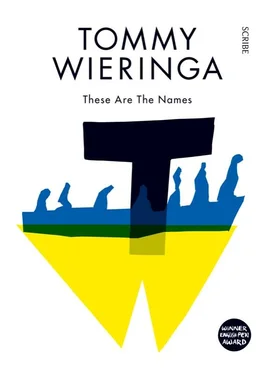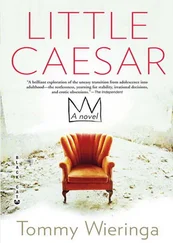In rags worn to threads, they had appeared from the darkness of centuries past. Two of them were sitting on the ground, rooting slowly, mechanically, through the garbage bags in front of them. Their jaws ground the frozen slops. Plumes of vapour rose around their heads. Because his brain was locked up tight, Budnik started classifying what he was seeing — the beginning of understanding. He saw a child, probably a boy; he saw two men and a woman. He saw that they were not reacting to his presence. Another one came out of the bushes — a man, an emaciated saint with a beard down to his chest. He looked teary-eyed into the headlights — then his hands, too, began rooting through a garbage bag.
Why were they weeping? What sorrow was it? Or was it something else? Budnik had no intention of leaving the vehicle. He called the dispatcher.
‘I can’t read you, Car 37,’ the woman at the desk said.
‘Send back-up, goddamn it!’ he whispered.
As he watched, the situation remained largely the same. They emptied garbage cans and tore open the bags. The road was littered with trash. The occasional pedestrian came by, on the other side of the street, and then went running off.
At nine, a second patrol car came down the street. It parked beside him. Patrolman Toth climbed out. Only then did Budnik leave his car, his Makarov clenched in one hand.
‘Holy Mother of God,’ his colleague stammered. ‘Who are these people?’
Budnik nodded in a way that said he was already familiar with the situation. The fact that he had been here for a while gave him a jump on things. That authority gave him the right to lead the operation — if only he knew what to do.
They stood in the light of their high beams, a few metres away from the scene. ‘Who are you people?’ Budnik shouted. They heard the crackle of frozen plastic; sometimes, the gasping breath of someone weeping.
‘Not from around here,’ Budnik said quietly.
‘I think … arrest them,’ his colleague said.
‘Yeah, sure,’ Budnik said absently. He looked over at Toth. ‘But for what?’
What a disgusting thought, to have to touch those decrepit bodies. To sit in the car with them, to breathe the same air. In fact, yes, for what? A couple of garbage cans. Once you started down that road, you could go on all night. He tried to focus. To assess the risks. What were they failing to do that could later be held against them?
‘What are they crying about?’ Toth whispered.
Budnik shrugged. He tightened his grip on the pistol. Indecision was weakness. Capitulation could pass for wisdom. He took a step back — the step with which the retreat begins.
‘Come on,’ he said, ‘we’re going to Tina’s.’
In the days that followed, there were sightings here and there. Their appearance prompted a shudder of excitement. The untouchables became a persistent rumour; in the alleyways of the bazaar and the streets of the city, it hopped like a virus from one mouth to the next. The descriptions were so vivid that it seemed as though everyone had seen them with their own eyes. No one knew who they were or where they had come from; the general assumption was they had come in from the steppes. It was as though victims of the plague had walked into the city. Their numbers varied from five to fifteen. They seemed to be everywhere, all at the same time. In the collective imagination, the armies of the undead marched through the streets of Michailopol. They were gawked at and stared after, and no one dared speak to them.
Thefts were reported. Chickens disappeared from their coops; geese were plucked from behind fences. At night, when the temperature fell to twenty degrees below zero, no one knew where they stayed. The lock merchants at the bazaar did good business. It was mid-December; a cold sun lay on the icy-blue horizon. In Pontus Beg’s office, the phone rang. ‘The mayor, for you,’ Oksana said.
Semjon Blok was in the midst of his second term as mayor of Michailopol. He had built his empire on slot machines. You saw his one-armed bandits everywhere. He had gone into politics to gain status in the straight world, the world of people who attended the Bolshoi and rarely saw a slot machine. His nickname was Mister Cash — during his campaign he had paid his staff in rolls of coins. As Mister Cash he was elected by a wide majority; the tough materialism he embodied was an example to the man on the street. Whether he’d actually gained access to the circles of those who attended the Bolshoi was up for grabs.
‘Pontus, I’m hearing things,’ he said.
‘I’m listening,’ Beg said.
‘Transients, Pontus. A group of — how shall I put it … starving people. I see reports about them. They’re going around stealing. People say they’ve never seen anything like it. Who are they, you know what I mean? What are they doing here? We need to find out, Pontus. We don’t know them — it’s an impossible situation. We have to know who’s who around here. Transparency, Pontus, that’s my motto. Bring them in, do something. Don’t ask me what.’
Like ataman Chiop, Blok had the irritating habit of addressing him only by his first name — the way you might piss on a puppy’s head to make it obey. Could you ask someone to stop doing that? In writing, maybe. He wasn’t sure.
‘We’ve had the report here, too,’ he said. ‘We have an eye on them.’
A deep sigh. ‘What do you guys do there, anyway? Arrest these people. Get them off the street.’
Beg knew that the mayor would prefer to send a couple of guys from his own club to deal with it. There was a real chance that he actually would get to them first. Free enterprise is so much more efficient than the public sector.
He said he would give it top priority, and hung up.
Budnik and Toth told everyone at Tina’s about their encounter — a ghost story. ‘Hunger like that,’ Budnik said. ‘You’ve never seen anything like it.’
‘The way they were crying,’ Toth said, ‘that’s what I thought was … It was real crying. You only cry like that when you … well, yeah.’
Their listeners stared into space. ‘Things like that happen,’ one of them said. The others remained silent because they didn’t know what to say; two of them had witnessed something they couldn’t explain, and had run away from it. They had described a forlornness that seemed beyond this world — a sense of horrors that couldn’t be told.
Things beyond their control.
‘Tina!’
Tina came over and filled all their glasses.
‘Cheer up, guys,’ she said. ‘It can’t be all that bad.’
Budnik and Toth smiled wanly, and knew there was comfort in the sight of her bosom. So, too, when she walked back and forth behind the bar, in the tight leather skirt into which she had wedged her flesh. They were too young to have known her in her capacity as a trollop, but in the course of time their imaginations had been set afire by the stories their colleagues told — stories that made their blood run hot and made them mourn lost ground that could never be recovered.
The razzia began by order of the powers that be — vagrants were picked up all over town. The basement cells were packed. Fights broke out. One detainee was stabbed in the neck with a pen that the guards had overlooked. Almost every transient in town was swept off the streets, but the ones they were looking for weren’t among them. They seemed to have vanished from the face of the earth. The sightings that were reported were too diverse to all be true.
Maybe, Beg and Koller reasoned during a meeting, they had moved on and were trying to cross the border.
‘Then we’ll be hearing from them again,’ Koller said.
The border was locked down tight. Every car, every truck, and every train was searched twice — first on this side, then on the other. The technology on the other side belonged to the domain of science fiction. They had heartbeat detectors, carbon-dioxide sensors that betrayed people’s presence by their own breath, infra-red cameras, and night-vision equipment — all their technological ingenuity was applied to catching illegal migrants. Visas were awarded only very rarely; anyone headed for the other side took refuge in illegality. Countless of them became stranded at the border. Michailopol was home to many of those who had been picked up and sent back. They often remained drifting, and never returned home.
Читать дальше











